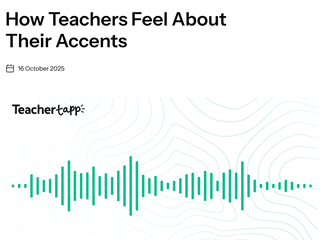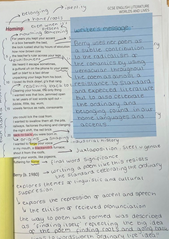If you’re a keen follower of the British news media, you might be aware that, at this very moment, the English Language is in great peril; not only is the semicolon under threat, but the beloved full stop seems to be dying out too. And on top of that, American English is taking over, speakers with regional accents are being promoted in the media ahead of traditional RP speakers and GenZ can barely lift their eyes from their phones to utter more than a grunt or random ‘skibidi’ to their parents.
It's a pretty grim picture out there if you believe these horror stories of linguistic decline, but of course if you look a bit more closely at the stories above, who reports them and what they are based on, the real picture is a bit more complex and not all that grim at all.
One of the most useful and easily transferable skills developed in the English Language A Level (and of particular importance in a world that’s crying out for more media literacy) is something we look at as part of ‘language discourses’ for AQA or ‘topical language issues’ for OCR. Students are encouraged to not just know about language – how it varies, how it’s changing and how to analyse it - but also to critically assess what others say about it. So that means reading news reports and opinion pieces about language through a critical lens: what are they saying and how are they framing it? Is this really just about language? How does this relate to what linguists have researched and what I know already? And also, what agendas might be at work?
To do this, students need to:
a.) know some things about language study (which is more than can be said for some of the people who write opinion pieces for the UK press), and
b.) have their own views about language: ideally, informed by the linguists who study the language and from their own experiences as language users.
Let’s take a look at a couple of the themes from the stories I started with. While all of them represent the English language as being in decline (a complaint as old as the language itself, if not older), some of them lay the blame squarely at the door of young people and their relationship with technology. Last year it was ‘brain rot’ slang that was the issue, five years ago it was the emoji, and twenty years before that it was texting. The claim that the full stop is in decline is linked to an assumption that young people are scared by it (or TRIGGERED by it as one memorable Mail Online text used in an AQA exam a few years ago put it).
But linguists who have studied online communication can tell us a lot about what’s happening with the full stop and why its use is changing. There might be some truth about it being used less by young people (just as there is some truth in ‘like’ being used more by them), but that’s because among a much more varied range of ways to end a message – an ellipsis, an emoji, nothing at all (because another message is only seconds away) - the full stop now means something different; it has become a choice and with choice comes a different meaning.
So the headline is partly right – the full stop might be in decline in certain modes of communication in certain forms - but does that mean it’s dying out? Hardly. Why cover it in this way then? Well, an astute A Level English Language student could probably tell us a thing or two about how declinist, ‘crumbling castle’ models of prescriptive thinking are emblematic of certain news agendas, that language stories often fall into ‘culture wars’ territory and that certain publications love to farm clicks and engagement at the expense of younger generations and marginalised groups, because they know it generates traffic. It’s exactly the kind of story which a bit of A Level English Language study can really help to critique.
One of the linguists recently asked to discuss the issue of punctuation and online communication on Michael Rosen’s BBC show, Word of Mouth, is Dr Christian Ilbury of Edinburgh University, who coincidentally is one of the main speakers at our teacher conference, Language Change, Digital Communication & Social Media, which is coming up on September 30th. Christian recently published Researching Language and Digital Communication: A Student Guide with Routledge. Our other main speaker is Dr Andreea Calude from Waikato University in New Zealand who published The Linguistics of Social Media: An Introduction, also with Routledge in 2023.
They will be looking at how social media has changed our language in recent years and how we create and perform identity online and along with their two keynotes, there will be workshops led by Andreea and me, in which we will be looking at how to analyse social media texts and what to make of the media stories we see about technology, focusing on how to analyse and respond to them with students.
It’s going to be a packed day and a rare chance to get bang up-to-date research directly from experts in the field, as well as generous discounts on their books!






